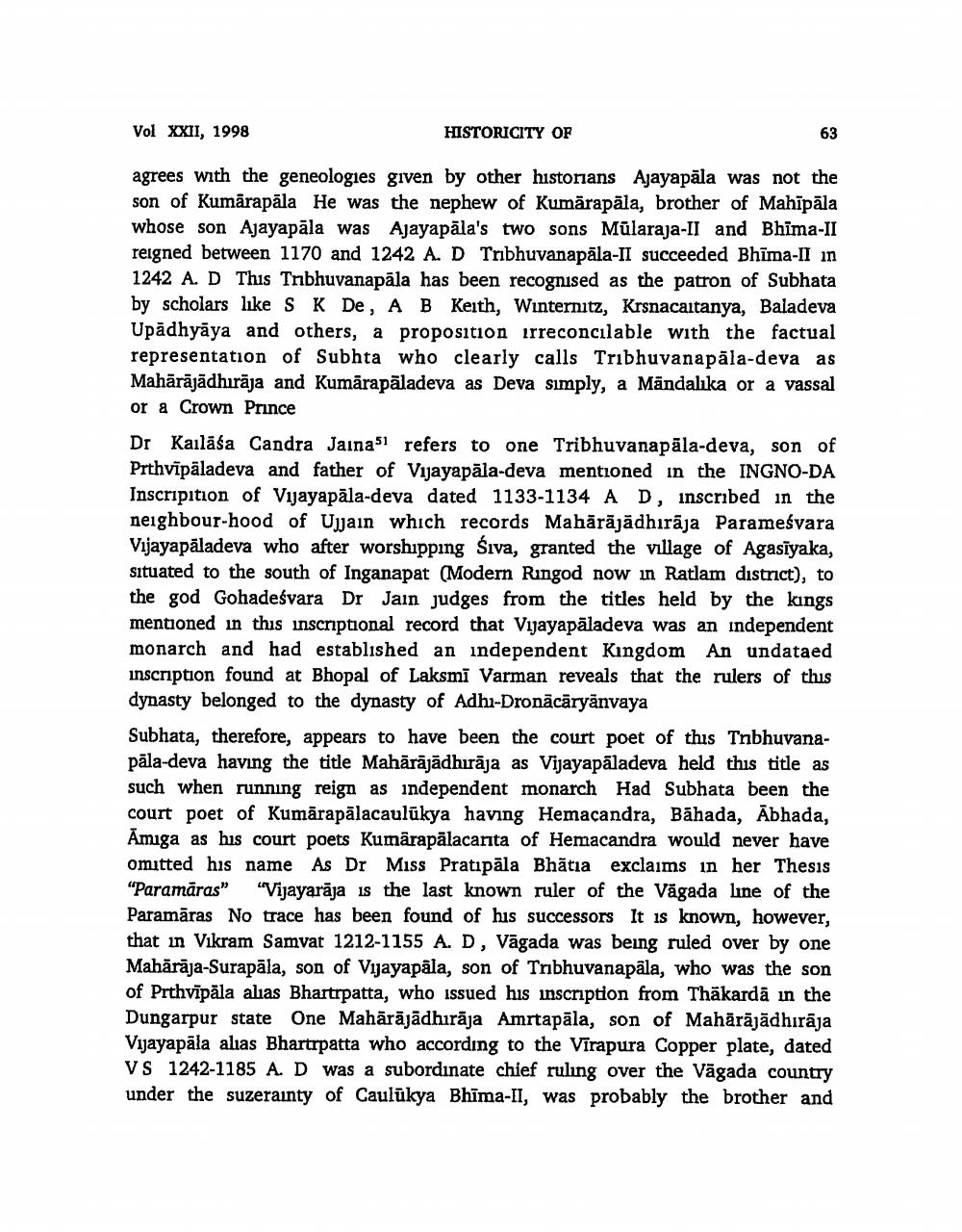________________
Vol XXII, 1998
HISTORICITY OF
agrees with the geneologies given by other historians Ajayapāla was not the son of Kumārapāla He was the nephew of Kumārapāla, brother of Mahīpāla whose son Ajayapāla was Ajayapāla's two sons Mūlaraja-II and Bhima-II reigned between 1170 and 1242 A. D Tribhuvanapāla-II succeeded Bhīma-II in 1242 A. D This Trbhuvanapāla has been recognised as the patron of Subhata by scholars like S K De, A B Keith, Winternitz, Krsnacaitanya, Baladeva Upādhyāya and others, a proposition irreconcilable with the factual representation of Subhta who clearly calls Tribhuvanapāla-deva as Mahārājādhırāja and Kumārapāladeva as Deva simply, a Māndalıka or a vassal or a Crown Prince Dr Kailāśa Candra Jainası refers to one Tribhuvanapāla-deva, son of Prthvīpāladeva and father of Vijayapāla-deva mentioned in the INGNO-DA Inscription of Vijayapāla-deva dated 1133-1134 A D , inscribed in the neighbour-hood of Ujjain which records Mahārājādhırāja Parameśvara Vijayapāladeva who after worshipping Śiva, granted the village of Agasīyaka, situated to the south of Inganapat (Modern Ringod now in Ratlam district), to the god Gohadeśvara Dr Jain judges from the titles held by the kings mentioned in this inscriptional record that Vijayapāladeva was an independent monarch and had established an independent Kingdom An undataed inscription found at Bhopal of Laksmi Varman reveals that the rulers of this dynasty belonged to the dynasty of Adhi-Dronācāryānvaya Subhata, therefore, appears to have been the court poet of this Tnbhuvanapāla-deva having the title Mahārājādhırāja as Vijayapāladeva held this title as such when running reign as independent monarch Had Subhata been the court poet of Kumārapālacaulūkya having Hemacandra, Bāhada, Ābhada, Amiga as his court poets Kumārapālacanta of Hemacandra would never have omitted his name As Dr Miss Pratipāla Bhātia exclaims in her Thesis "Paramāras" "Vijayarāja is the last known ruler of the Vāgada line of the Paramāras No trace has been found of his successors It is known, however, that in Vikram Samvat 1212-1155 A. D, Vāgada was being ruled over by one Mahārāja-Surapāla, son of Vijayapāla, son of Tribhuvanapāla, who was the son of Prthvīpāla alias Bhartrpatta, who issued his inscription from Thākardā in the Dungarpur state One Mahārājādhırāja Amrtapāla, son of Mahārājādhiraja Vijayapāla alias Bhartrpatta who according to the Vīrapura Copper plate, dated VS 1242-1185 A. D was a subordinate chief ruling over the Vāgada country under the suzerainty of Caulūkya Bhīma-II, was probably the brother and




